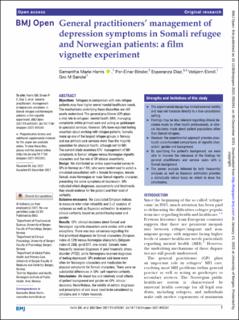| dc.contributor.author | Harris, Samantha Marie | |
| dc.contributor.author | Binder, Per-Einar | |
| dc.contributor.author | Perez, Esperanza Diaz | |
| dc.contributor.author | Ekroll, Vebjørn | |
| dc.contributor.author | Sandal, Gro Mjeldheim | |
| dc.date.accessioned | 2022-01-28T13:20:22Z | |
| dc.date.available | 2022-01-28T13:20:22Z | |
| dc.date.created | 2022-01-03T08:39:21Z | |
| dc.date.issued | 2021 | |
| dc.identifier.issn | 2044-6055 | |
| dc.identifier.uri | https://hdl.handle.net/11250/2940722 | |
| dc.description.abstract | Objectives Refugees in comparison with non-refugee patients may face higher unmet mental healthcare needs. The mechanisms underlying these disparities are still poorly understood. The general practitioner (GP) plays a vital role in refugees’ mental health (MH), managing complaints within primary care and acting as gatekeeper to specialist services. However, GPs have reported feeling uncertain about working with refugee patients. Somalis make up one of the largest refugee groups in Norway and use primary care services more than the majority population for physical health, although not for MH. The current study examines GPs’ management of MH complaints in Somali refugee versus Norwegian vignette characters and the role of GP clinical uncertainty.
Design We distributed an online experimental survey to GPs in Norway (n=133), who were randomised to watch a simulated consultation with a female Norwegian, female Somali, male Norwegian or male Somali vignette character, presenting the same symptoms of depression. GPs indicated which diagnoses, assessments and treatments they would endorse for the patient and their level of certainty.
Outcome measures We calculated Simpson indices to measure inter-rater reliability and 2×2 analysis of variances as well as Bayesian estimation to examine clinical certainty based on patient background and gender.
Results GPs’ clinical decisions about Somali and Norwegian vignette characters were similar, with a few exceptions. There was less consensus regarding the first prioritised diagnosis for Somali characters (Simpson index=0.129) versus Norwegian characters (Simpson index=0.208), (p=0.011, one-tailed). Somalis more frequently received diagnoses of post-traumatic stress disorder (PTSD), while Norwegians received diagnoses of feeling depressed. GPs endorsed sick leave more often for Norwegian characters and medication for physical complaints for Somali characters. There were no substantial differences in GPs’ self-reported certainty.
Conclusions We found few and relatively small effects of patient background and gender on GPs’ clinical decisions. Nevertheless, the validity of certain diagnoses and prescription of sick leave need to be considered by clinicians and in future research. | en_US |
| dc.language.iso | eng | en_US |
| dc.publisher | BMJ | en_US |
| dc.rights | Navngivelse 4.0 Internasjonal | * |
| dc.rights.uri | http://creativecommons.org/licenses/by/4.0/deed.no | * |
| dc.title | General practitioners’ management of depression symptoms in Somali refugee and Norwegian patients: a film vignette experiment | en_US |
| dc.type | Journal article | en_US |
| dc.type | Peer reviewed | en_US |
| dc.description.version | publishedVersion | en_US |
| dc.rights.holder | Copyright 2021 The Author(s) | en_US |
| dc.source.articlenumber | e055261 | en_US |
| cristin.ispublished | true | |
| cristin.fulltext | original | |
| cristin.qualitycode | 1 | |
| dc.identifier.doi | 10.1136/bmjopen-2021-055261 | |
| dc.identifier.cristin | 1973458 | |
| dc.source.journal | BMJ Open | en_US |
| dc.relation.project | Norges forskningsråd: 273645 | en_US |
| dc.identifier.citation | BMJ Open. 2021, 11, e055261. | en_US |
| dc.source.volume | 11 | en_US |

